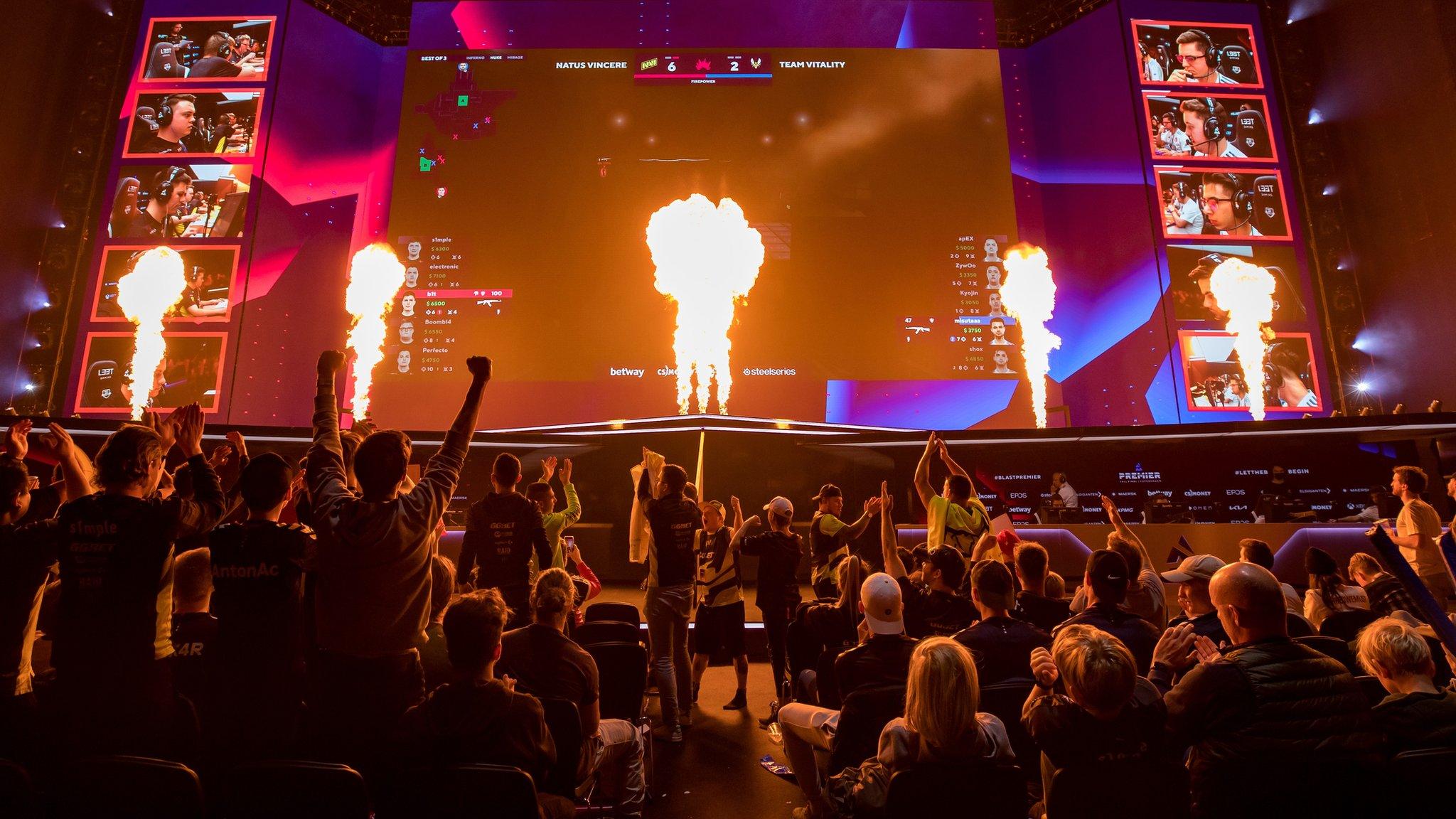Esports: Young gamers compete before Commonwealth Games pilot
- Published
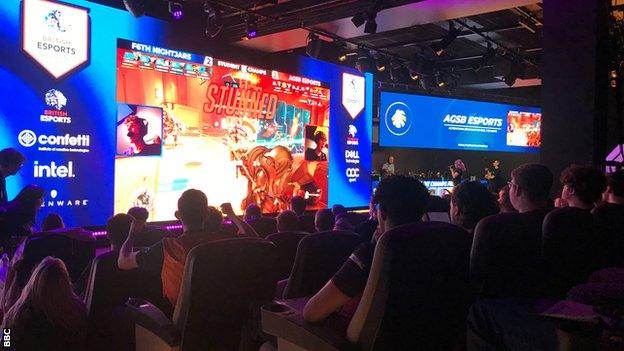
The British Esports Student Champs Grand Finals in Nottingham
Fans gather in a large, dimly lit room with a big screen at its forefront and colourful strip lighting that illuminates the dark corners.
You would be forgiven for thinking it is a cinema or even a nightclub. But this is the British Esports Student Champs Grand Finals - the national championships of the UK college gaming scene.
"The Student Champs are really important," Alice Leaman, head of operations at British Esports, says.
"It's a year long competition with weekly fixtures and finals just like any academic sports team.
"We started the competition in 2018 with only about four or so colleges taking part. It's grown about 40% every year.
"This year alone we've seen a growth of 130% in terms of teams competing. People are just more aware of esports now."
'Mentally taxing'
When the Commonwealth Games Federation announced esports would be trialled alongside the Commonwealth Games in Birmingham this year, the reaction was mixed.
The gaming community welcomed the surprise move while traditionalists found it difficult to understand how playing computer games could be considered a real sport.
"Despite not being as physically taxing as traditional sports like football or rugby, it's definitely mentally taxing and you can still suffer injuries," Joe, from Queen Mary's College, Basingstoke, says as he competes in the finals at Nottingham's Confetti X arena.
"Like if you get a bad wrist injury you can't play for the rest of your life, just like if you had a bad broken leg in football."
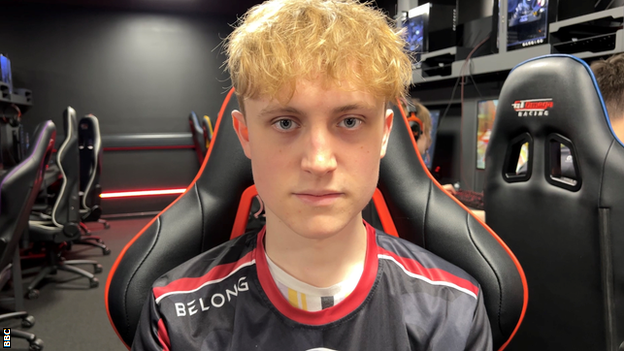
Joe is a player on Queen Mary College's competitive esports team
UK colleges from all over the country fought hard to qualify for the event after months of competition.
"The season has been a great experience, we've won flawlessly, we haven't lost a single Overwatch match in Division Three", George from Farnborough College of Technology Pythons, says.
"The team has trained really hard all year and they've grown significantly, not only as players, but as people. We struggled a bit early on in the season with our strategy but the team sat down, reset and figured out a better way forward, and it worked."
Some of the UK's best young gamers compete in four games, Overwatch and Valorant [shooters], Rocket League [car football] and League of Legends [fantasy strategy].
During bouts - which can last well over 90 minutes - frantic chatter projects from the main stage where the players sit in their teams, looking out at the crowd, with one hand gripped on the mouse and the other furiously tapping away on the keyboard.
Sitting in their rally-driver style chairs the players are fully locked-in.
Like F1 drivers talking to the pit crew, they communicate through their headsets and make in-game adjustments to their strategy and tactics with passion and urgency.
"We have a general game plan but it might not work, so we have to very quickly decide, on the spot, which way to go or who to attack first - it's very involved and super intense," says Ned, who plays for the Sixth Form College Farnborough Nightjars.
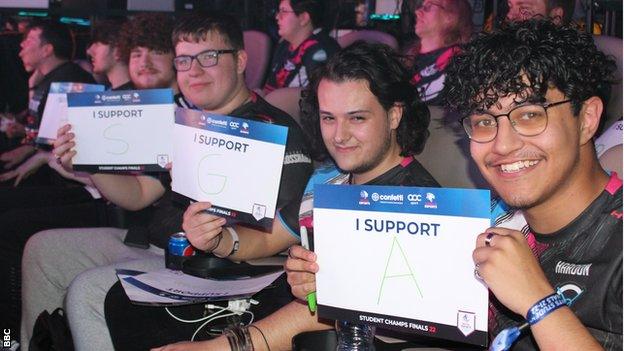
"We've come to support our friends and meet our college rivals"
Before the teams appear on stage for the headline events, more than 100 spectators cram into the rows of seats and at least a dozen or so stand or sit on the fringes because the arena is so packed with spectators.
Some hold signs with written messages to cheer on their favourite team or player, while others bang together inflatable batons and break out into cheers when their team takes the lead.
Of the 14 colleges and academies who qualified for the finals, five hailed from the south of England, making the region the best represented in the entire country.
"Having Queen Mary Basingstoke and Farnborough Tech here at the finals has been really positive," says Steve Cale, esports manager at Sixth Form College Farnborough.
'Cup final atmosphere'
"It's great to see the south represented here. We're hoping to work more closely together in the future to make the region the best it possibly can be in esports. We're doing the south proud I think.
"When we won the Rocket League final it genuinely felt like a football cup final atmosphere and that's something I really hope the conventional sports community will eventually see.
"You do get some similarities in Rocket League - goals, cheering and the final whistle and release of euphoria."
Members of college teams who did not make the finals are at Confetti and help to produce the esports pilots alongside the Commonwealth Games.
"It's like real sports - it brings everyone together, it has a rule-set, it is watched by millions of people all over the world - even if you don't realise it", Kira, who plays on Queen Mary College Samurai, says.
George, from Farnborough Tech, adds: "Esports is 100% a sport, like chess - it's a game with a set of rules and a declared winner."
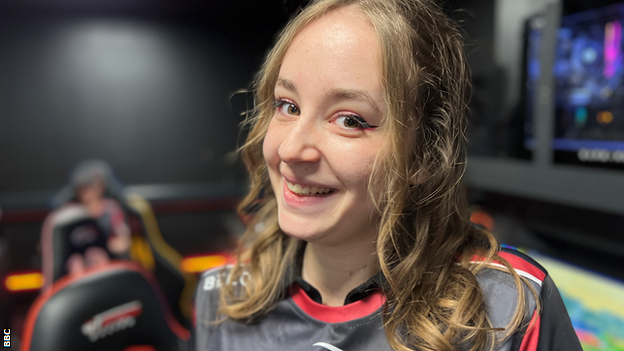
"Esports is watched by million of people all over the world," says Kira, of Queen Mary's College Samurai
When you see the action unfolding on stage, it is hard to argue their points.
The seriousness of what is at stake is only reinforced on the walk to the practice area, where teams scrimmage against one another.
A winding corridor leads to the basement of the facility and it feels like a tunnel walk from the stadium to the team dressing room at half-time.
The "Scrim Room" is a hive of activity with players, in their team jerseys, getting some last-minute practise in before they to head to the main arena and compete against their peers for titles, trophies and bragging rights.
For first time ever, competitive gaming will run alongside a major sporting event when it is trialled as part of the Commonwealth Games, due to be held in Birmingham this month.
"In recent years, we have seen a dramatic rise of esports in terms of popularity and participation, particularly the participation of young people", says Dame Louise Martin, president of the Commonwealth Games Federation (CGF).
"For some time the CFG has been looking for a way to formally engage with esports, to explore how it can align with the Commonwealth Sports Movement and its support of the sustainable development of digital infrastructure, connectivity and commerce across the Commonwealth."
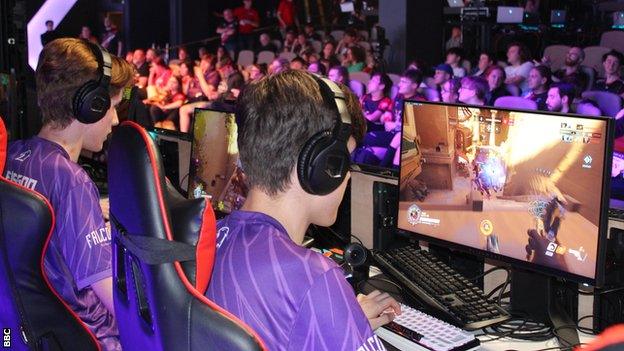
Only 14 UK colleges out of more than 120 qualified for the Grand Finals
Watching the competitive gamers battling their opponents, making play calls, sweating over their keyboards and celebrating every success with high fives before a raucous crowd cheers them on, it is clear there are elements of competitive sport on display at these Student Champs Grand Finals.
"I've been to a football match but I think I'd rather come to this to be honest," says Laura, whose son Aiden is captain of Sixth Form College Farnborough's Overwatch team.
"It's great for people that aren't so sporty to be part of a team and have that experience as well - that's one of the things I really like about it.
"To keep that concentration and focus in such a high speed game for over an hour is quite something. I think people underestimate these kids and think they're 'just playing computer games."
The Commonwealth Games Federation has aspirations for esports to become a full medal event in 2026 following the Birmingham pilot this summer.
Related topics
- Published9 February 2022
